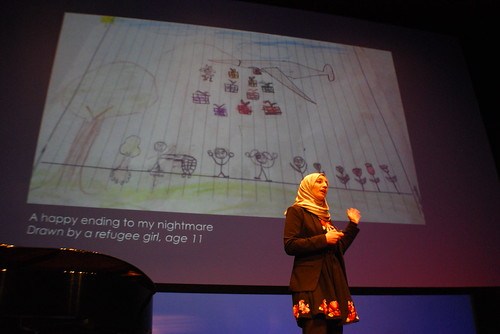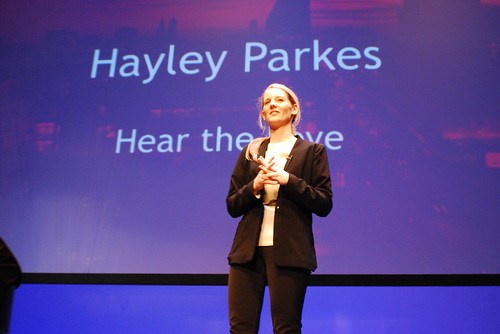
Yesterday the stage was set for the second Emerging Tech Manchester event (#etechmcr). After much bouncing emails back and forth with some skype calls inbetween. Erik Lehmann came to Manchester all the way from the states.
I can’t express how amazing this actually happened, especially since I was only introduced to Erik in a last few months.
His talk and the questions and answers went on for a while but everybody was super engaged and fascinated by such a passionate and heartfelt talk. Erik is such a warm and joyful person and I loved the little nuggets of thoughts he threw out as he talked. Luckily Ethar caught some of them.
That's an interesting phrase "With" organisation instead of "For" organisation #etechmcr
— Ethar Alali (@EtharUK) March 21, 2016
Mentioned while Erik was talking about sponsorship and support from big business. Which led to the idea of a hypocrisy index… Radical transparancy?
Loving the idea of a "hypocrisy index" #etechmcr
— Ethar Alali (@EtharUK) March 21, 2016
I especially loved the idea of what would the occupy movement do with something like Graphene.
"Occupy Movement plus #Graphene" interesting idea 🙂 #etechmcr
— Ethar Alali (@EtharUK) March 21, 2016
We did stream the whole thing over periscope thanks to Adam.
Thanks to everybody who came to #etechmcr, @DreamCatalyst_ was great and inspirational.
— Ian Forrester (@cubicgarden) March 21, 2016
But the like most things, the best parts were the discussion which happened afterwards in the bar over food and drink which Erik very generously paid for. We had talked before about sponsorship options but we were both agreed that we wanted people there because they wanted to be there, even if it reduced the audience. This came up in the bar afterwards too, as someone else made the point about people expecting/wanting free drinks.
London Geekdinners was mainly a paid for event, meaning people paid to go! The same person afterwards said a similar thing about her event.
I don’t have a problem with sponsorship (as long as it makes sense and they don’t try and take over) but lets get real a lot of events are community/non-profit run events. If the reason you are going is because of the free pizza or drink… Its not fair on the people who work hard to make it happen and the speakers who are most likely not getting paid and giving up their time for the joy of it too.
Erik for example was not paid and came a long long way because he believes in the wealth of networks and wants to connect with people who may want to help…
It's not about convincing, it's about modeling the change #ETechMCR
— Ian Forrester (@cubicgarden) March 21, 2016
The conversations were wide ranging and as Erik had said in his talk, the strength and ultimately the wealth of the network was why he was there and why the game-changer movement will be a success. In years to come, it will be great to look back and say we were able to connect him with more people who help.
Yes its a shame we got a smaller turn out but Rise Manchester was a great venue to host the event and we thank Rise for the loan of a great space. Its also a shame I couldn’t connect Erik with the Graphene institute, MadlabUK, Open Data Manchester and many others great people in the Manchester area.
Thank you again to everybody who came and Erik for travelling so far for the event. I will be sure to send people Eriks way forever more.






































